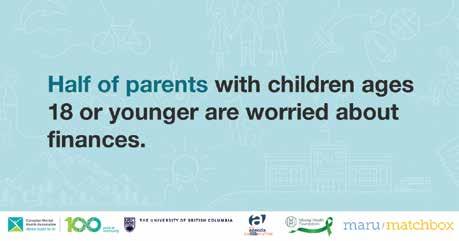
3 minute read
How parents can encourage resiliency amid COVID-19

Methods to build resiliency within your child despite life’s unexpected circumstances
While public health messaging tells us children are less likely to become seriously sick from COVID-19, research shows children may be some of the most vulnerable to its negative mental health effects. Twenty-four per cent of Canadian parents have described a deterioration in their children’s mental health since the beginning of the pandemic (CMHA, 2020). Supporting a child experiencing stress and anxiety amid COVID-19 is a difficult and delicate balance, particularly when you may be feeling similar emotions. By working with your child, you can find methods to encourage resiliency.
Reminders for parents with an anxious child
• Be understanding and patient as your child learns and practices new coping strategies.
• Set personal boundaries for yourself and seek external help, if needed. • If other family members are affected by your child’s anxiety, consider seeking family counselling (CMHA, n.d.).
Signs of resilience
Research conducted in partnership with the Canadian Mental Health Association (CMHA) has found 66 per cent of Canadian parents have reported spending increased quality time with their children, and 38 per cent of parents have observed increased resilience (strength and perseverance) in their children. Amidst the COVID-19 pandemic stress, these are encouraging signs of resilience for parents and their children (CMHA, 2020).
Build a resiliency toolkit with your child
The pandemic is an unexpected life circumstance that requires resilience to manage effectively. “Resiliency means coping well with problems, stress and other difficult situations. Resiliency is what helps you look at the situation realistically, take action when you can make changes, let go of things you can’t change and recognize the helpful supports in your life” (CMHA, n.d.). As you and your child put together a COVID resiliency toolkit, consider skills like problem-solving, selfcalming exercises, gratitude practice and identifying support networks.
Encourage your child to speak openly about their emotions
Acknowledge and affirm the difficulties of the pandemic and all the pressures that come with it. COVID-19 is an additional element to other life stresses with which your child must contend.
Practice self-calming exercises
It is incredibly beneficial for parents to model healthy coping skills during periods of high stress, and there are a number of calming activities you and your child can practice together.
• Meditation: Learn about mindfulness
https://www.psychologytoday. com/ca/blog/creativedevelopment/201802/5-mindfulnessapps-children.
• Five senses mindfulness activity:
Learn how to practice this simple mindfulness activity here: https:// www.anxietycanada.com/articles/ using-your-senses/.
• Gratitude practice: Read Psychology
Today’s suggestions to foster gratitude in your child: https://www. psychologytoday.com/ca/blog/ thinking-about-kids/201712/5-waysfoster-gratitude-in-children.
Reach out for support
Your child may benefit from talking about their anxieties and stress through external resources such as therapy provided by a counsellor or a peer support group. If you would like to learn more about support services near you, visit ementalhealth.ca.
Additional mental health resources for parents:
• Caregiver Connections: Family peer support: https://alberta.cmha.ca/ documents/caregiver-connectionsfamily-peer-support/.
• BounceBack: Mental health resources
for youth and adults, with specific COVID-19 mental health support: https://bouncebackbc.ca/covid19/.
Check in with your child every day, and realize they may not want to share their concerns or worries instantly. As long as your child knows you are always available, they will open up when ready.
References
Canadian Mental Health Association. (n.d.). Anxiety Disorders. [Webpage]. Retrieved December, 2020, from: https://alberta.cmha.ca/documents/ anxiety-disorders/ Canadian Mental Health Association. (2020, June 25). Warning signs: more Canadians thinking about suicide during pandemic. [Article]. Retrieved September, 2020, from: https://cmha.ca/news/ warning-signs-more-canadians-thinkingabout-suicide-during-pandemic
Canadian Mental Health Association. (n.d.). Mental Health for Life. [Webpage]. Retrieved December, 2020, from: https://cmha.ca/resources/mentalhealth-for-life
Canadian Mental Health Association. (2020, September 11). Taming your back to school worries. [Article]. Retrieved December, 2020, from: https://cmha. ca/blogs/taming-your-back-to-schoolworries. n












